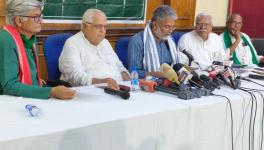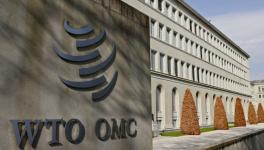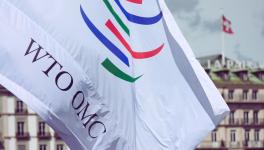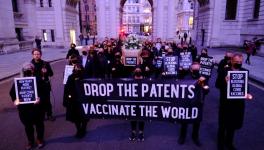Biden’s Decision on TRIPS Waiver is Political Theatre
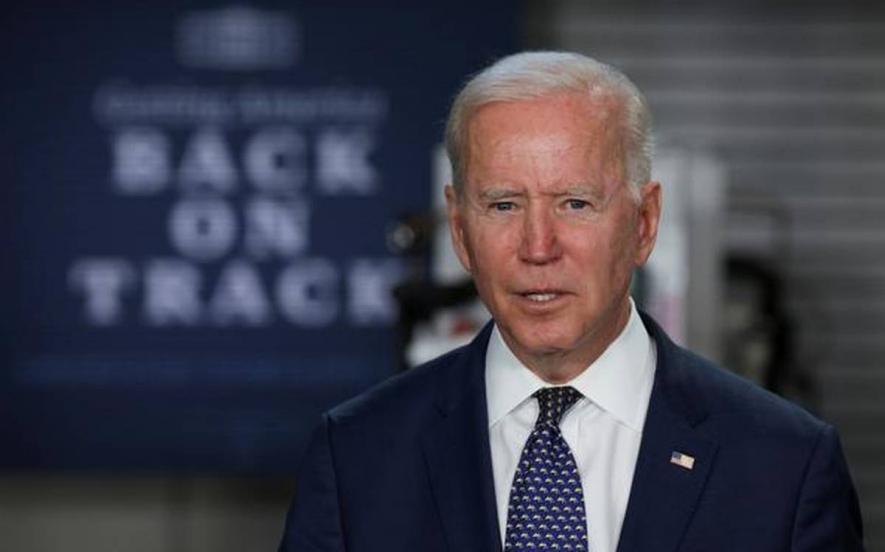
Image Courtesy: Reuters
The Ministry of External Affairs (MEA) has welcomed the statement of the US government of May 5, announcing their support for a relaxation in the norms of the agreement on TRIPS (Trade Related Intellectual Property Rights), to ensure quick and affordable access to vaccines and medicines for developing countries. Delhi is “hopeful that with a consensus based approach, the waiver can be approved quickly at the WTO.” But is the optimism warranted?
The US statement itself is cautiously worded and is non-committal. It only says: “We will actively participate in text-based negotiations at the World Trade Organization (WTO) needed to make that happen. Those negotiations will take time given the consensus-based nature of the institution and the complexity of the issues involved.”
The Biden administration’s emphasis continues to be on “our vaccine supply for the American people.” It is an America First strategy. President Biden has plans to at least partially vaccinate 70% of adults by July 4, so that herd immunity develops that will help the level of new infections to drop.
Biden’s decision on the TRIPS waiver can only be seen as a political decision. A Reuters report says citing informed sources: “Wednesday’s decision allows Washington to be responsive to the demands of the (American) left and developing countries, while using WTO negotiations to narrow the scope of the waiver. Since the negotiations will take time, the decision also buys time to boost vaccine supplies through more conventional means.”
In effect, the Biden Administration is juggling several balls in the air. On the one hand, the progressive Left in the US politics, including Sen. Bernie Sanders and Rep. Alexandria Ocasio-Cortez in the Democratic Party, has been demanding TRIPS waiver for COVID vaccines; equally, developing countries, supported by WHO and UN, are also demanding the waiver;
India, a key Indo-Pacific ally of the US, was the initiator of the proposal on TRIPS waiver back in December; and, in principle, the Biden Administration is committed to “multilateralism”.
On the other hand, Biden, whose political life of half a century was largely spent in the US Congress, is well aware of the awesome clout of the pharmaceutical companies in American politics. From that lobby’s perspective, the patent waiver “amounts to the expropriation of the property of the pharmaceutical companies whose innovation and financial investments made the development of Covid-19 vaccines possible in the first place,” as a senior scholar at the Johns Hopkins Center for Health Security, puts it.
The US pharmaceutical industry and congressional Republicans have already gone on the offensive blasting Biden’s announcement saying it undermines incentives for American innovation. Besides, the argument goes, even with the patent waiver, vaccine manufacturing is a complex process and is not like simply flipping a switch.
Sen. Richard Burr, the top Republican on the US Senate Health Committee, has denounced Biden’s decision: “Intellectual property protections are part of the reason we have these life-saving products; stripping these protections only ensures we won’t have the vaccines or treatments we need when the next pandemic occurs.” The Republican senators backed by Republican Study Committee Chairman Jim Banks propose to introduce legislation to block the move.
Clearly, Biden would rather spend his political capital on getting the necessary legislation through the Congress to advance his domestic reform agenda rather than spend time and energy to take on the pharmaceutical industry to burnish his image as a good Samaritan on the world stage.
Conceivably, Biden could be counting on the “text-based negotiations” at the WTO dragging on for months, if not years, without reaching anywhere. The US support for the waiver could even be a tactic to convince pharmaceutical firms to back less drastic steps, like sharing technology and expanding joint ventures, to quickly boost global production. So far, COVID-19 vaccines have been distributed primarily to the wealthy countries that developed them, while the pandemic sweeps through poorer ones, such as India, and the real goal is, after all, expanded vaccine distribution.
Biden is well aware that there will be huge opposition to the TRIPS waiver from the US’ European allies as well. The British press has reported that the UK has been in closed-door talks at the WTO in recent months along with the likes of Australia, Canada, Japan, Norway, Singapore, the European Union and the US, who all opposed the idea.
Whereas the MEA claims that “the proposal has received the support of more than 120 countries,” western reports put a conservative figure of 80 countries. The WTO has 164 members and all countries must agree before a waiver gets approved. It does seem a long shot. Curiously, Germany has already scrambled to forcefully reject Biden’s proposal.
This is a race against time, since it is a real possibility that some super spreader variant with very powerful immune evasion may well appear in a near future. According to Josh Schiffer, an infectious disease expert at Fred Hutchinson Cancer Research Center, “It’s just next to impossible to predict what’s going to happen next. I think the likelihood that we would have a variant that emerges, that is worse than the ones we’re dealing with now, is much higher if you have a higher circulating number of infections, such as what’s happening in Latin America or India.”
Suffice to say, rapid vaccination is of critical importance. Even with partial protection, India can achieve higher degrees of herd immunity. Partial herd immunity is already causing the level of new infections in the US to drop despite the highly infectious B.1.1.7’s prevalence. Britain’s experience has also been the same. Expert opinion is that but for the partial herd immunity, many regions in the US and UK would probably look like India right now with the new variants.
Stephane Bancel, the Moderna CEO, has warned that more COVID-19 variants will emerge in coming months. Suffice to say, India simply must accelerate its COVID-19 vaccination rates. If the TRIPS waiver materialises, well and good. But, like the tramps in the Samuel Beckett play Waiting for Godot, we cannot engage in a variety of discussions and encounters and wait for the TRIPS waiver that may never arrive.
According to reports, the government has plans to significantly ramp up the production of the Bharat Biotech’s Covaxin, which has reportedly shown efficacy of 81% as per phase III interim analysis results. Bharat Biotech is aiming to make 700 million doses out of its four facilities by the end of the year. Another option will be to go for large-scale production of the Russian vaccine Sputnik V, which has an efficacy over 91% (according to the results published in The Lancet.)
The Russian Direct Investment Fund, which is marketing the vaccine, has signed deals to produce more than 750 million doses of Sputnik V in India with six domestic vaccine makers, according to reports. Public sector companies can also be roped in to increase the production capacity for Sputnik V vaccine.
Get the latest reports & analysis with people's perspective on Protests, movements & deep analytical videos, discussions of the current affairs in your Telegram app. Subscribe to NewsClick's Telegram channel & get Real-Time updates on stories, as they get published on our website.












